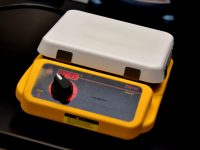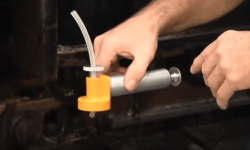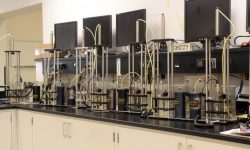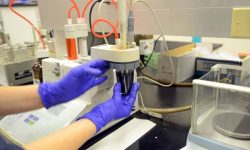Crackle Test: Do You Know Your Detection Limits?
The crackle test has always been an accepted test within the oil analysis community. With its roots in engine oil analysis the quick and simple test is considered effective in detecting over 500 ppm of water. But as you migrate away from engine oils into industrial oils the 500 ppm detection limit is no longer valid in all oil types; specific oil types exhibit different crackle detection limits. Understanding the specific detection limit for your oil type is critical to an effective oil analysis program.
Crackle Test
The crackle test is a standard laboratory test to detect the presence of water in lubricating oil. A drop of oil is placed on a hotplate that has been heated to approximately 400° F. The sample then bubbles, spits, crackles or pops when moisture is present. At TestOil, when the crackle test is positive, indicating the presence of water, a Karl Fischer titration is performed to quantify the water. If the crackle test is negative it simply means that the level of water present in the sample is below the detection limit; it doesn’t necessarily mean the sample is void of water.
Questions
What is the detection limit for the test? Does the detection limit change depending on the lubricant type? Do you know what your limits for water should be? How important is it to know water contamination? Are detection limits above my condemnation limits?
Study
In an effort to communicate to our customers the limitations of the crackle test in detecting water contamination TestOil embarked on a lab study to uncover crackle detection limits. We ran a total of 493 samples comprised of a variety lubricant types on a 400° F hot plate. The samples were assessed for a positive or negative crackle. These same samples were then analyzed for water contamination using a Karl Fischer titration (ASTM D6304-C). The water results were recorded in parts per million (ppm). The following table summarizes the results of the study. The table lists oil type, the number of samples in the study, the detection limit range, the lowest negative crackle value, and the highest positive crackle value.
Results
| OIL TYPE | Samples Tested | Detection Limit (ppm) | Lowest Positive (ppm) | Highest Negative (ppm) |
| Turbine | 111 | 110-610 | 110 | 610 |
| Mineral Gear | 62 | 240-1190 | 240 | 1190 |
| Synthetic Gear | 86 | 100-460 | 100 | 460 |
| AW Hydraulic | 86 | 320-750 | 320 | 750 |
| Polyol Ester | 36 | 340-1830 | 340 | 1830 |
| Phosphate Ester | 37 | 450-1140 | 450 | 1140 |
| Engine | 40 | 320-580 | 320 | 580 |
| Wind Turbine (Optigear) | 35 | 780-1070 | 780 | 1070 |
| Combined | 493 | 100-1830 | 100 | 1830 |
Discussion
The “Lowest Positive” values represent those samples which exhibited a positive crackle and the associated Karl Fischer result while the “Highest Negative” values represent those samples which clearly had water present according to the Karl Fischer, yet did not crackle. Clearly, the study demonstrates that there is quite a bit of variance in the water detection limit of the crackle test and you really need to know your lubricant type before making assumptions on what the crackle can detect. In some cases, your water limits may fall below crackle detection and it would be worth the cost to run a Karl Fischer on every sample. Just make sure you understand the detection limits for the crackle test and know your lubricant’s tolerance for water.
About TestOil
With more than 30 years of experience in the oil analysis industry, TestOil focuses exclusively on assisting industrial facilities with reducing maintenance costs and avoiding unexpected downtime through oil analysis program implementation. As industry experts in diagnosing oil-related issues in equipment such as turbines, hydraulics, gearboxes, pumps, compressors and diesel generators, TestOil provides customers with a guarantee of same-day turnaround on all routine testing. With in-house certified training professionals, TestOil offers lubrication and oil analysis training, private onsite training, certification training and exams, and educational webinars. For more information on partnering with TestOil on oil analysis programs or training opportunities visit www.testoil.com. Contact us: 216-251-2510; sales@testoil.com.






